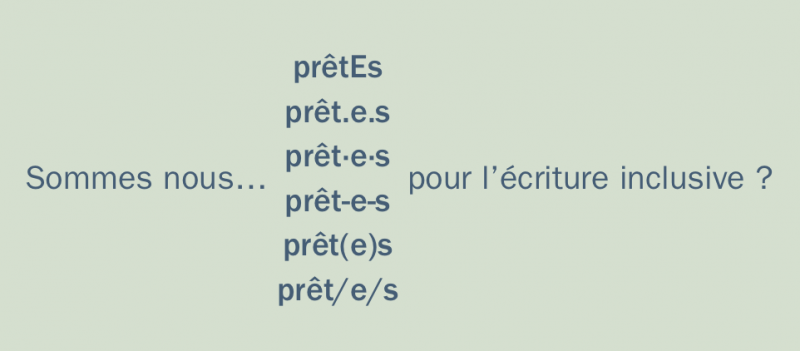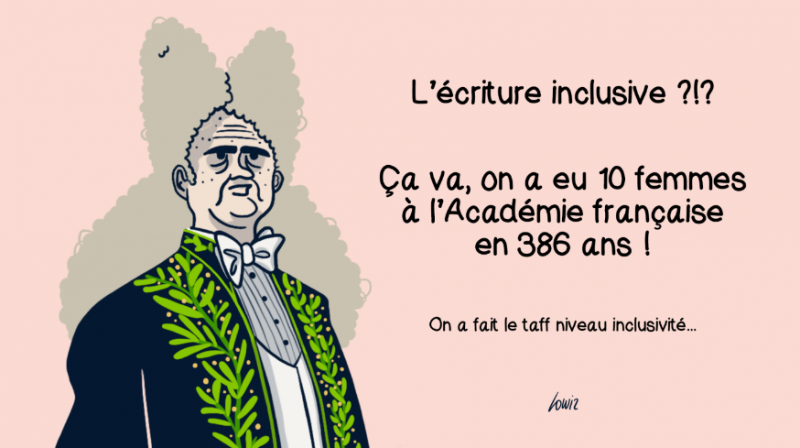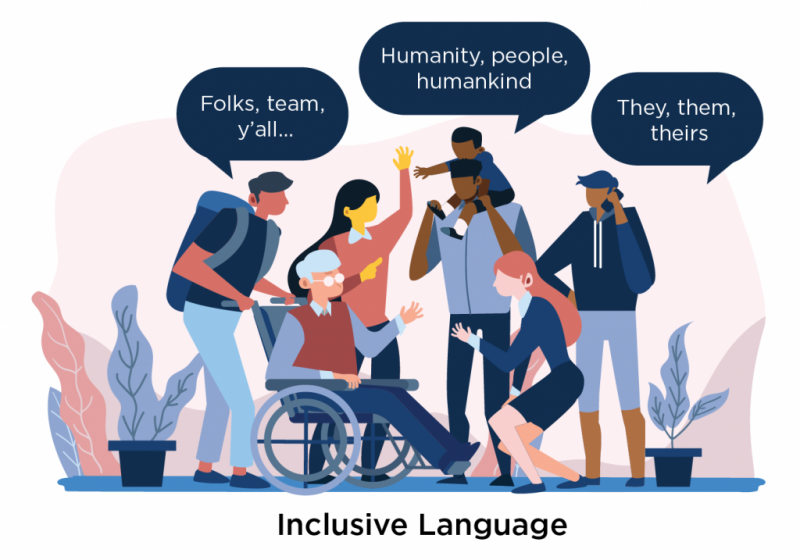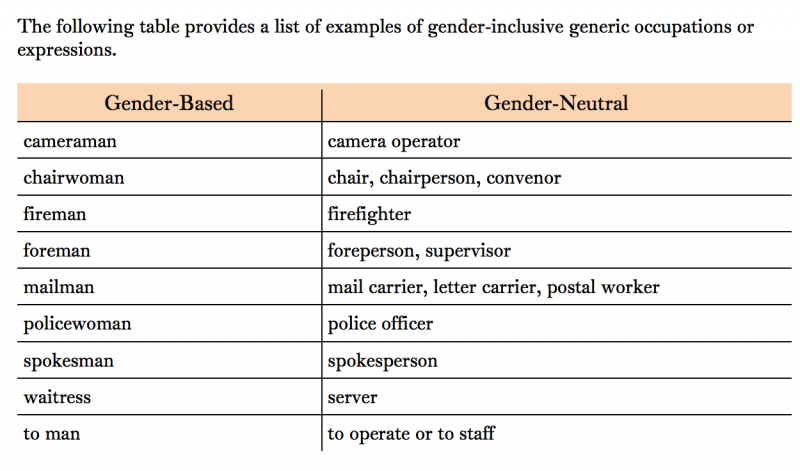Les francophones sont-ils (ou elles!) prêt.e.s pour le langage inclusif?


Faut-il adopter le langage inclusif ou préserver l’intégrité de la langue française? Peut-on avoir le beurre et l’argent du beurre? Étant donné les discussions sur l’inclusivité de genre, le langage inclusif est un sujet plus polémique que jamais pour les francophones. Pour certain.e.s, c’est encore une tentative d’angliciser la langue française, tandis que d’autres le voient comme la possibilité de mieux représenter des communautés marginalisées, telles que les femmes et la communauté LGBTQ+. On a rencontré quelques Québécois.es et Français.es pour voir ce qu’ils et elles en pensent.
Qu’est-ce que le langage inclusif?

Selon Ambre, une Française, le langage inclusif a comme but “[d’]intégrer tous les lecteurs ou les récepteurs pour qu’ils/elles puissent se trouver identifié.e.s par le texte [ou le message à l’oral].”
Les principes du langage inclusif:
- Accorder les noms de métiers, fonctions et titres selon le genre de la personne (par ex., “une professeure” ou “une policière”)
- Utiliser la forme masculine et féminine au pluriel, soit par l’emploi du point milieu (par ex., “les Canadien.ne.s”), soit en reformulant la phrase (par ex., “les personnes au Canada”)
- Remplacer le mot “homme” dans des expressions courantes (“les droits humains” au lieu de “les droits de l’homme”)
Maya, une Montréalaise, a admis qu’elle n’a jamais entendu le terme avant notre discussion. “Mais pour être honnête, moi je trouve que c’est une super bonne idée. Si c’est l’équivalent de qu’est-ce que ça veut dire en anglais, bien! Pourquoi pas?” dit-elle avec enthousiasme.
Même si tout le monde ne comprend pas le concept, il y a des avis tranchés sur le sujet.
En ce qui concerne le gouvernement, le ministre français de l’éducation a interdit le langage inclusif, soutenant que sa “complexité” et son “instabilité” constituent des “obstacles à l’acquisition de sa langue comme de la lecture.”
Des avis partagés
Si le but du langage inclusif est l’égalité de genre, quel est le problème? D’après Maxime, un Québécois qui vit actuellement en Ontario, le problème ne se trouve pas dans l’intention, mais dans l’exécution.
Il préfère l’emploi des termes épicènes comme option inclusive plus lisible, comme “le personnel” plutôt que “les employé.e.s”. À propos des pronoms neutres, tels que “iel,” il ne sait pas quoi penser. “Honnêtement je ne sais pas si je suis pour ou contre. C’est assez nouveau comme concept.”
Par contre, Thaïs, un Français de Bordeaux, croit que le langage inclusif est incontournable. “C’est tellement important, ” insiste-t-iel. “Je pense que le langage qu’on utilise façonne notre manière de penser et que si on utilise un langage où on n’inclut pas la moitié et plus de la population, on va avoir tendance à penser [de ne pas les inclure].”
Une construction féministe?

Vu que la masculinité l’emporte traditionnellement sur les autres genres en français, il y a un mouvement par les minorités de genre et les alliés pour se réapproprier la langue genrée. Thaïs souligne l’importance d’écouter les personnes concernées.
“Si les femmes disent qu’elles se sentent pas représentées avec l’accord au masculin, écoutons-les! Il y a pas de point plus fort que ça, je pense.”
Changer la langue ou faire évoluer les mentalités?
La réponse n’est pas si simple.
Selon Maya, il faut surtout tenir compte de la diversité des pays francophones. “Entre la France et le Québec, c’est sûr que vous allez avoir des réponses différentes, mais ça dépend aussi [de votre entourage],” précise-t-elle.
On voit le langage inclusif de plus en plus dans le monde universitaire, l’université McGill et l’Université de Montréal allant jusqu’à écrire des guides sur l’écriture inclusive.
“C’est compliqué de changer les mentalités des natifs et de vraiment intégrer toutes les nouvelles règles qui sont apparues dernièrement,” explique Ambre.
Selon Thaïs, la France pourrait être le dernier pays à adopter le langage inclusif. Mais si les Français.es peuvent discuter “business” par “e-mail” avant de faire du “shopping” le “week-end” sans sourciller, tout peut arriver!
Pour en savoir plus :
Are francophones ready for inclusive language?

Should Francophones adopt inclusive language or preserve the integrity of the French language? Can they have their cake and eat it too? With the topic of gender inclusivity on the rise, inclusive language is now a more controversial topic than ever for Francophones. For some, it is yet another attempt to anglicize the French language, while others see it as an opportunity to represent marginalized individuals, such as women and the LGBTQ+ community. We sat down with four students from Quebec and France to hear their perspectives on the topic.
What is inclusive language?

According to Ambre, a third-year student from France, the goal of inclusive language is “to include all readers and listeners so that they feel represented in the text [or the conversation].”
Key principles for inclusive language in French:
- Gender agreements when stating someone’s occupation, duties and/or title (e.g, businessman or businesswoman)
- Using both the masculine and feminine forms of the word in its plural form, either by adding periods to include both forms (e.g., Canadien.ne.s) or by rewording the sentence (e.g., “okay, class” instead of “okay, boys and girls”)
- Replacing the word “man” in common expressions (e.g., “humankind” in place of “mankind”)
Maya, from Montreal, admitted that she had never heard of the term “inclusive language” prior to the interview. “But if I’m being honest, I think it’s a great idea. If it works in English, why not in French?” she says enthusiastically.
Though not everyone understands the concept, there are still strong opinions on the matter.
As far as the government is concerned, the French Minister of Education has banned the use of inclusive language in schools, arguing that its “complexity” would create “barriers to learning the French language, as well as reading.”
Divided opinions amongst Francophones
If the goal of inclusive language is gender equality, what exactly is the problem? For Maxime, a Quebecer who lives in Ontario, the problem is not in the intention, but rather the execution.
He prefers using gender-neutral alternatives that are easier to read, such as “police officers” rather than “policemen and policewomen”. Regarding gender-neutral pronouns, such as “they/them” (“iel” in the French language), he is undecided. “Honestly, I don’t know if I am for or against inclusive language. It’s a fairly new concept.”
On the other hand, Thaïs, a French student from Bordeaux, thinks that inclusive language is a must. “It’s very important,” they insisted. “I think that the language we use shapes the way we think and if we use language that doesn’t include half of the population or more, we’re going to have certain ways of thinking [which would not include women and non-binary people].”
Inclusive language: a feminist construct?

Seeing that the masculine form traditionally takes precedence over other genders in French, there is a movement by gender minorities and allies to reclaim the gendered language. Thaïs highlights the importance of listening to those who are impacted by this issue.
“If women [and non-binary people] say that they don’t feel represented by the use of the masculine form as the default, listen to them! I don’t think there’s a stronger point than that.”
Changing the French language or changing Francophones’ mentalities?
The answer is not so simple.
According to Maya, it is especially important to consider the diversity of Francophone countries. “Between France and Quebec, you’re sure to get different opinions, but it also depends on the types of people that you surround yourself with,” she stated.
Inclusive language is used more and more in the world of academia, with some universities, such as McGill University and the University of Montreal, going as far as writing guides on inclusive writing.
“It’s hard to change the mindsets of native French speakers and to integrate all of the new rules that have come out lately,” explains Ambre.
According to Thaïs, France could be the last country to adopt inclusive language. However, if French speakers are willing to use anglicisms on a daily basis without batting an eye, anything can happen!
To read more, visit:


